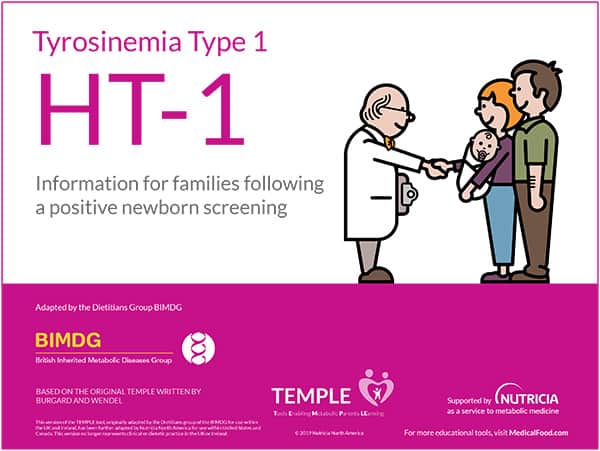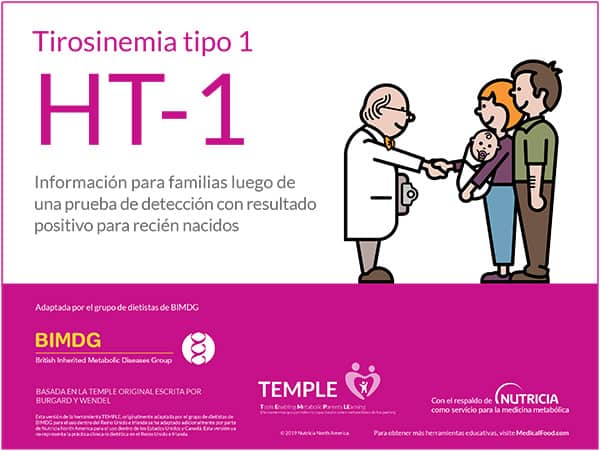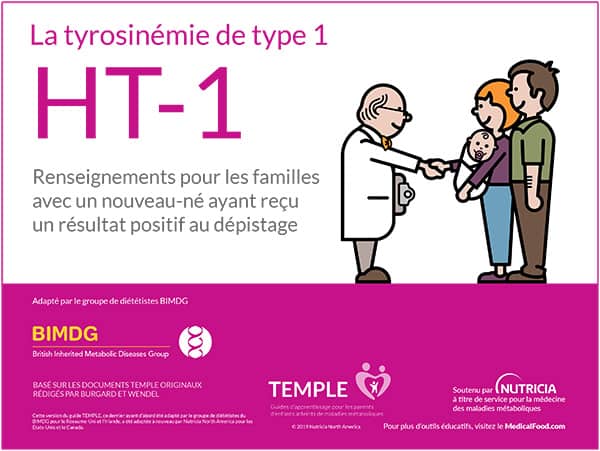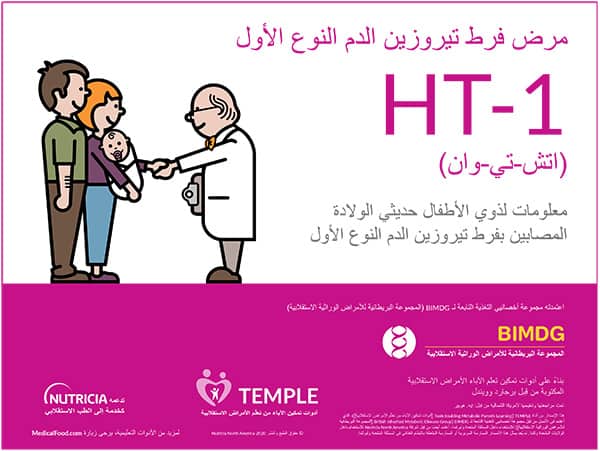TYR - Tyrosinemia Education & Support
Tyrosinemia or TYR (referring to tyrosinemia type 1*) is an inherited, genetic disorder. TYR occurs due to a deficiency of the enzyme fumarylacetoacetic hydrolase (FAH). A deficiency of FAH interferes with the breakdown of an amino acid called tyrosine. Tyrosine is one of 20 amino acids that make up the protein that is found in our bodies and the food we eat. Digestion breaks protein down into individual amino acids. The body can convert another amino acid, phenylalanine, to tyrosine.
If TYR is not treated, toxins such as succinylacetone build up and cause serious medical problems in the liver, kidneys and brain. If TYR is not diagnosed early and treated, most infants will die from liver failure. A milder form may lead to liver disease, kidney problems, rickets, growth failure and neurologic problems.
Finding out that your child has TYR can be overwhelming. Fortunately, nutrition management and medication are available to help prevent many of these problems. Take comfort in knowing that your metabolic healthcare team can provide you with the best advice to help manage TYR.
*There are other types of tyrosinemia (types II and III). These have different, less severe symptoms and different treatment approaches.
Incidence, Genetics and Newborn Screening
TYR is a rare disorder that occurs in about 1 in every 100,000 births in the United States and Europe. TYR occurs more often in Norway, Finland and in the province of Quebec, Canada.
TYR is inherited as a “recessive disorder.” In recessive disorders, both the mother and father are “carriers,” and they do not have any symptoms of the disorder. With each pregnancy there is a 1 in 4 (25%) chance that the infant will be affected. A genetic counselor can help explain the inheritance of TYR and the risks to future infants.
TYR can be screened for at birth through a simple blood test. For details on newborn screening (NBS) in the US, visit https://newbornscreening.hrsa.gov/your-state; for information on NBS in Canada, visit https://www.raredisorders.ca/.
There is no cure for TYR, but it can be managed with a modified diet, medication, and special medical formulas specifically designed for persons with TYR. The modified diet for TYR is low in tyrosine and phenylalanine. It is important that an individual with TYR continues with management for life. Another medical option for some patients with TYR is a liver transplant. Your metabolic physician will discuss the options that are best.
A medical formula is a very important part of the diet for TYR. The protein source in TYR medical formulas is individual amino acids, but tyrosine and phenylalanine are left out. This allows a person with TYR to get enough protein without the parts of protein that can be harmful. Medical formulas may also provide calories, vitamins and minerals the body needs for normal growth.
To provide just enough tyrosine and phenylalanine that a person with TYR needs, a limited amount of natural protein-containing foods are allowed in the diet. For infants, breast milk or regular infant formula is given in precise amounts. As the baby grows and can eat solid foods, the breast milk or regular infant formula will be removed from the diet and the tyrosine and phenylalanine will come from foods instead.
Since all foods with protein contain tyrosine and phenylalanine, individuals with TYR must limit their intake of foods high in protein. These include milk and dairy products, meat, poultry, fish, eggs, beans, nuts and peanut butter. Regular breads and pastas may be allowed, but special low protein versions of these foods are often used instead to allow for more choices in the diet and less concern for eating too much protein. Vegetables and fruit are allowed in measured amounts. Foods may have to be weighed or measured to ensure that excess protein is not eaten.
Nutricia North America provides a range of medical formulas as well as low protein foods. Please contact us for more information. Your dietitian will help you decide which products are best.
Nitisinone is a drug designed to help manage TYR. Nitisinone blocks the formation of fumarylacetoacetate and succinylacetone. Studies of nitisinone have had good results. Your metabolic physician will discuss nitisinone with you.
Monitoring
An important aspect of management is frequent monitoring to make sure diet, formula prescription and medication dose are appropriate. Monitoring typically includes blood and urine tests. Liver function tests and abdominal scans will also be performed regularly.
Acceptable blood tyrosine levels in individuals with TYR may differ slightly among medical centers. However, typical management ranges for tyrosine are 200-400 μmol/L and for phenylalanine are 50-100 μmol/L. Higher plasma tyrosine levels could cause crystals in the cornea. The crystals will typically resolve once tyrosine levels are reduced. Talk with your metabolic team on the levels of tyrosine and phenylalanine they recommend.
During Illness
During illness or after an injury, the body increases the breakdown of protein from muscles and organs. This increases the risk of high levels of tyrosine and phenylalanine in the blood, which may, lead to increased succinylacetone production. During any illness, it is very important to notify your metabolic clinic immediately. The diet and/or medication dose may be adjusted.
Nutricia North America would like to thank Beth Ogata, MS, RD, University of Washington, Seattle for her consultation.
TYR Education
Tools Enabling Metabolic Parents Learning (TEMPLE)
Easy to understand education for families after a diagnosis of inherited metabolic disorders. These books and videos share the basics of what the disorder is and the genetics behind the disorder. TEMPLE books are currently available in 4 different languages.
Click on the booklet below to view and download in a language you prefer.
Low Pro Living Support
We have a library of information to help support families like yours throughout the various stages of life's journey. From big moments, like starting college to little ones like what to eat for dinner, we have tips and ideas to help you along the way.











